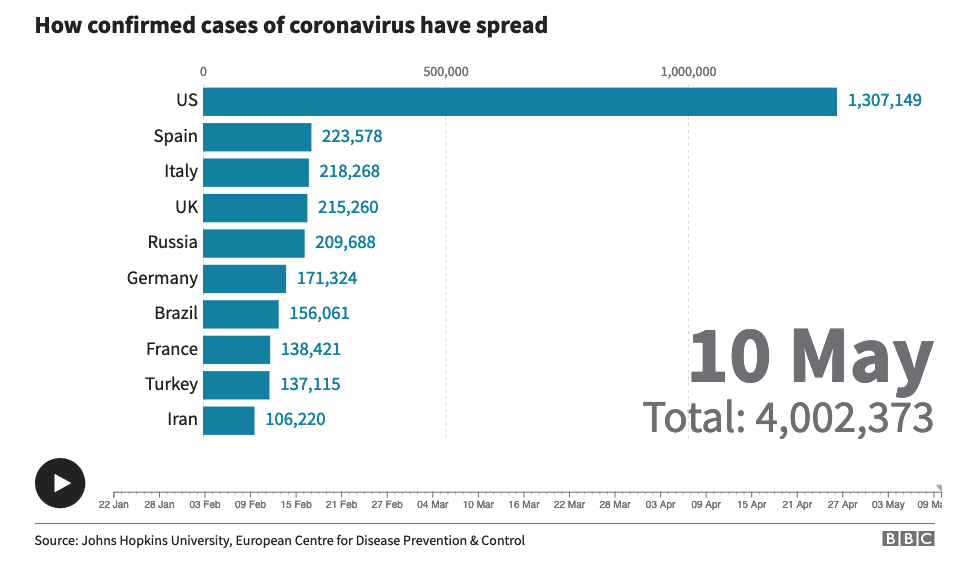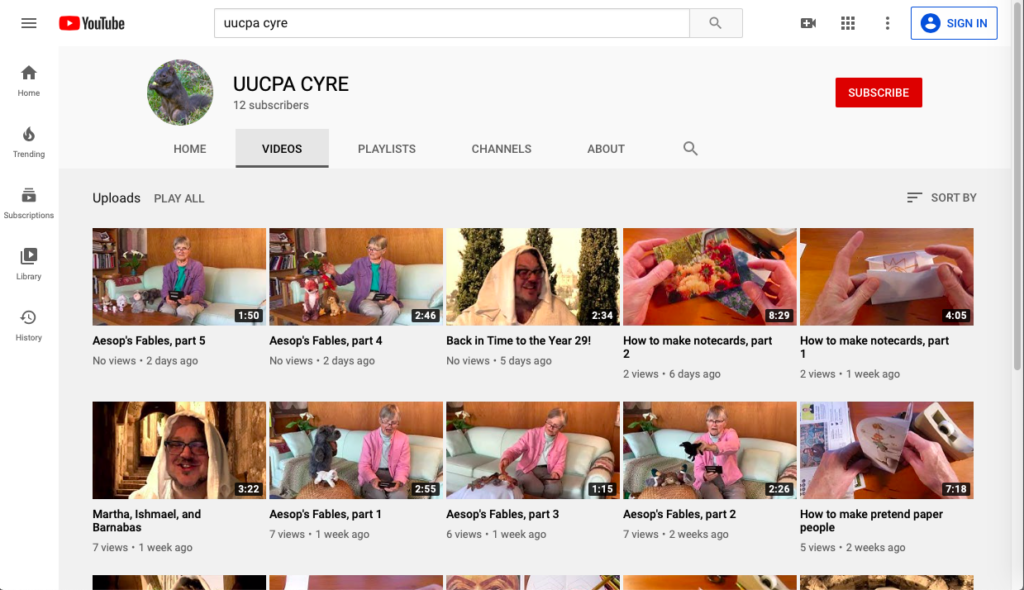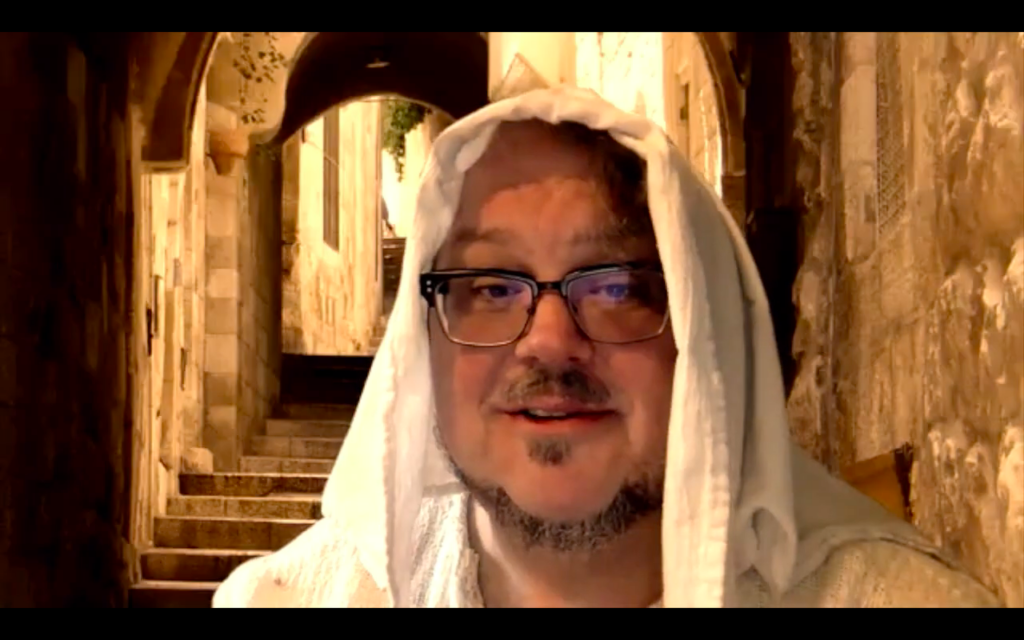A video of memories of the stuffed animal sleepover:

Yet Another Unitarian Universalist
A postmodern heretic's spiritual journey.
A video of memories of the stuffed animal sleepover:

When the County Commissioners of Palm Beach County, Florida, held a vote in a public meeting to mandate wearing face masks in the county, at least two of the public comments dove into bad theology (as captured on video, as shown on the BBC News Web site). One commenter forlornly said:
“They want to throw God’s wonderful breathing system out the door. You’re all turning your backs on it.”
By this theological argument, anything that is done that augments or alters God’s wonderful breathing system is forbidden. Thus, we should not allow surgeons to wear face masks while performing surgery; we should not supply supplementary air pressure or oxygen to help people breathe while flying on a jet at high altitudes; and so on. Clearly this argument is absurd on its face.
“You literally cannot mandate somebody to wear a [face] mask knowing that that mask is killing people…. And my — the people, we the people, are waking up, and we know what citizen’s arrest is. Because citizen’s arrests are already happening…. And every single one of you [the commissioners] that are obeying the Devil’s laws are going to be arrested.”
The bad theology here lies in the ill-defined phrase, “the Devil’s laws.” If the speaker defined what “the Devil’s laws” actually are (in her view), then there’s the possibility of a conversation with her about how she has misinterpreted the Devil’s laws. Instead, the speaker uses the phrase to block off any two-way conversation: she knows what she wants, and she’s not going to listen to anyone else.
I would also term this bad theology in part because by most definitions of the Devil, the Devil is a supernatural being who sows discord: this woman’s divisive speech, her threats against the commissioners, are sowing discord, and therefore by most definitions of the Devil she is, in fact, doing the Devil’s work for him. It’s also bad theology because she’s using religious terms as a bludgeon instead of using reason to come to understanding; but theology is actually firmly rooted in the assumption that God gave humans the capacity for reason, which leads to the conclusion that God wants humans to use their reason instead of jumping to unreasoned conclusions; by going against God’s purpose for human beings, the speaker is (once again) doing the Devil’s work. Finally, it’s bad theology because the speaker is using her irrational arguments to justify vigilanteism; again, by most definitions of the Devil, the Devil is a being who loves vigilanteism because it breaks down the social order; once again the speaker is doing the Devil’s work for him.
Oh dear. Such bad theology!
There were, of course, people who spoke rationally about the necessity of wearing masks. One commenter said:
“I’m going to speak on behalf of a friend who’s home sick with COVID. She says she did not wear her mask for one day at the beach, and a friend who was asymptomatic infected her and fifteen other people. And she said [to me], ‘Please go there and tell them [the commissioners] I didn’t wear a mask because I so many other people without a mask on, [and] I forgot I was in the middle of a pandemic.”
Forget the bad theology. Wear your mask.
The BBC reports that scientists are expecting more pandemics like COVID-19. Why?
“Many scientists agree that our behaviour — particularly deforestation and our encroachment on diverse wildlife habitats — is helping diseases to spread from animals into humans more frequently. According to Prof Kate Jones from University College London, evidence ‘broadly suggests that human-transformed ecosystems with lower biodiversity, such as agricultural or plantation landscapes, are often associated with increased human risk of many infections’.”
In other words, COVID-19 is a result of environmental destruction and mismanagement. And those of us in the wealthier countries are especially culpable:
“The current crisis, Prof Eric Fevre [from the University of Liverpool and the International Livestock Research Institute in Nairobi, Kenya] said, provides a lesson for many of us about the consequence of our own impact on the natural world. ‘All of the things we use and take for granted — the food we eat, the materials in our smart phones; the more we consume, the more someone will make money by extracting them and moving them around the world. So it’s incumbent on all of us to think about the resources we consume and the impact it has’.”
Harvard Business Review (HBR) has a couple of articles on virtual meetings. Back on March 5, they published an article by Bob Frisch and Cary Greene titled “What It Takes To Run a Great Virtual Meeting.” If you’re experienced at running online meetings, most of this will seem like good common sense, but you should read it anyway. Some of HBR’s suggestions should be obvious, like “test the technology ahead of time.” Others may be less obvious, but are still critically important, like “make sure faces are visible.” HBR suggests having a facilitator for meetings, someone who can take the pulse of the group; and one of their more innovative ideas is that the facilitator can use a parallel phone-based survey tool like “Phone Everywhere” to get that feedback.
An earlier article, published in 2015, by Keith Ferrazi was titled “How To Run a Great Virtual Meeting.” This covers much of the same ground, though with different emphases. Ferrazi spent a couple of years researching virtual meetings, and his article summarizes his research findings. One of my favorite points from this article: ban multitasking, because it doesn’t work and it slows down the team. I’ve been guilty of multitasking at virtual meetings, and it’s true: when I start checking email, I lose track of what’s going on in the meeting. That’s one reasons why Ferrazi says to leave video on: so you can see when someone is trying to multitask. (This, by the way, is a big drawback of Google Meet: depending on how you set up the meeting, you can only see 4 people at a time.)
An article by John Wimberly of Congregational Consulting Group got me started reading up on the topic. Wimberley titles his article “Will There Ever Be A Non-Virtual Meeting Again?” Wimberley says that once the COVID crisis ends, many urban congregations will keep doing virtual meetings because of the time it saves commuting to and from meetings. Actually, it’s not just urban congregations: congregations in suburban areas also have traffic problems; plus virtual meeting can include those who can’t travel at night (elders and people with young children); and for those of us in regional congregations, drawing from a big geographical area, virtual meetings allow our more far-flung members to participate. Before COVID-19 hit, our Palo Alto congregation was already doing hybrid meetings — some people in person, some people online — and I expect after COVID-19, there will be more committee and Board members who opt for the virtual option.
The bottom line: since virtual meetings are here to stay, we should learn how to run great virtual meetings.
The Unitarian Universalist Association (UUA) posted a notice today recommending that Unitarian Universalist congregations should consider NOT opening in-person meetings before May, 2021. You can read the recommendations here.
I’m glad the UUA has issued these recommendations. I had already come to most of the conclusions outlined in their recommendations. I’ve been trying to figure out how to gently break it to lay leaders and congregants who are already feeling weary of being stuck at home, already getting tired of Zoom meetings, that we really won’t be able to meet in person until there’s an effective vaccine and/or an almost universally effective treatment with incredibly robust contact tracing in place. Which means most likely no in-person meetings for at least another year — maybe longer in some areas.
The only thing I’d quibble about in the UUA recommendations is this statement: “It is the UUA’s strong recommendation that congregations plan for ongoing virtual gathering and operations through May 2021.” I would have added the phrase “at least” before “through May, 2021.” I don’t think there’s any guarantee that we will be able to resume in-person meetings by the end of May 2021; human beings are really good at false hope, and I wouldn’t want to encourage that human tendency.
That minor quibble aside, the recommendations are quite well done, especially in how they recognize that different congregations in different locales will face different sets of problems.
Best of all, now I don’t have to go through the trouble of summarizing all the research I’ve been doing. All I have to do is point to the UUA recommendations, and say, “This generally agrees with the research I’ve been doing.”
And then we can all say together, “OK, let’s plan for a year of online programming. How can we unleash our creativity, serve the needs of our members and friends, and make Unitarian Universalism in Silicon Valley serve the goodness of humanity?”
Religion New Service has reports on an important consideration before your church reopens:
You’ll want to talk with your insurer first.
Insurance companies, as you’d expect, are remaining “neutral on whether churches should reinstitute physical gatherings when restrictions are lifted.” Yet because they’re concerned with safety in general, insurance companies are offering concrete suggestions on how churches might one day safely reopen. According to Religion New Service:
“Guy Russ, Church Mutual’s expert on risk control, said his company’s recommendations include maintaining 6-foot distance from other parishioners in all directions, sterilizing all surfaces, using hard-cover seating options instead of fabric-covered pews to expedite cleaning, removing physical holy books or hymnals from use, and posting signage or projected messages to clearly indicate expectations for worship attendees.”
For our church in Palo Alto, that means reducing the seating capacity from 150 seats to about 50. Then since most of our chairs have fabric covers, we’d have to dig up 50 chairs with hard surfaces.
“Russ also stressed the need for religious groups to train staff and volunteers not only on cleanliness and social distancing practices, but also on how to address individuals who fail or refuse to comply with posted guidelines. In addition, he suggested houses of worship consider instituting some form of ‘contact tracing,’ whereby faith leaders either retain the contact information of people who attend events or use smartphone applications to help local authorities to trace the spread of the coronavirus if members of the congregation get sick.”
This means training a lot of volunteers. This also means taking attendance, including names and contact information, for all in-person services.
“‘If everybody has followed everything that you ask them to do and somebody who has attended an event at your facility becomes ill, what is your protocol going to be?’ he said. ‘We are recommending that each organization thinks through that question.'”
This means yet another safety policy for the Board of Trustees to vote on BEFORE reopening.
Plus there are other considerations. For instance, our music director tells us that we probably shouldn’t have any group singing, nor any group speaking, until there’s an effective vaccine — so no hymns. Beyond that, no choirs and no wind instruments either. From my perspective as an educator, I see major difficulties enforcing social distancing with younger children, so maybe there would have to be a lower age limit.
It begins to look like it will be a major challenge to hold in-person services before there’s an effective vaccine.
Which leads me to ask: What about those states that are allowing churches to reopen soon? Have they thought all these issues through?
More to the point, what about those churches that decide to reopen because they are sure God will protect them? Rev. Stephen Fearing of Beaumont Presbyterian Church in Lexington, Kentucky, has the best answer to that one:
“Bad theology has consequences.”
Former president Barack Obama has called the current presidential administration’s response to the coronavirus situation “an absolute chaotic disaster.” (Full quote here.)
Even accounting for some measure of political calculation, hoping to help his own party’s chances in the November election, there’s a lot of truth in what Obama said. For example, look at this bar graph showing the number of cases per country:

And to quote the BBC: “More than 77,000 people have now died and the US has 1.2m confirmed cases — both by far the highest in the world.”
I’m still trying to figure out how best to deliver kid-friendly and parent-friendly religious education during the age of shelter-in-place.
Videoconference Sunday school, using Zoom, works well for some families. For younger kids, the format that works best centers around a story, followed by some kind of activity to go with the story. Middle schoolers tend to want more peer interaction.
But with any age, kids (and parents) who have had enough videoconferencing through school won’t attend. How to reach them? I got feedback from some parents that online videos might be useful, IF they didn’t require parental supervision.
So I’ve slowly been building up a library of on-demand videos that, while not explicitly religious in nature, at some level promote UU values. Here’s some of what I’ve collected on the UUCPA CYRE Youtube channel:
A series of “How To Make” videos, that mostly require easily obtainable materials like scrap paper, scissors, a pencil, and maybe crayons and sticky tape. These videos show how to make things that promote imaginative play and give children a sense of active engagement and agency. With these, my goal as an educator is to move kids away from being passive consumers of online content, towards actively creating their own imaginative lives.
There are several series of read-aloud books. Senior minister Amy Morgenstern is reading aloud the classic book “The Secret Garden.” Children’s librarian and member of our congregation Beth Nord is reading aloud Aesop’s Fables (with help from her stuffed animal friends); a fun way to do moral education. Abby Kingsbury, UU and children’s librarian (and my sister) is reading aloud Alice’s Adventures in Wonderland and Through the Looking Glass; Abby describes Alice as an empowered girl protagonist who questions authority.
But this is very much a work in progress. I’m still trying to figure out how to provide the best content for kids that promotes UU educational values. If you have ideas for content I could create, I’d love to hear them! Or if you know videos created by UUs that I should consider adding to curated lists, let me know: ![]()

According to the Associated Press: “Louisiana authorities arrested pastor [Tony Spell] on an assault charge on Tuesday after he admitted that he drove his church bus toward a man who has been protesting his decision to continue holding mass gatherings at church in defiance of public health orders during the coronavirus pandemic.”
By contrast, after learning that the governor of Georgia planned to reopen churches and other businesses, despite contrary advice from public health professionals, “Bishop Reginald T. Jackson, the presiding prelate in Georgia for the African Methodist Episcopal Church, instructed the state’s roughly 520 AME congregations not to gather,” according to Religion News Service.
And by way of further contrast: Angelus Temple, a megachurch in Los Angeles, has now served 350,000 free meals during the pandemic, according to Religion News Service. The pastor, Matthew Barnett, said a few people disagreed with the decision to stop holding services in mid-March and concentrate instead of feeding people in need, but such criticism is “not productive in bringing about healing and possibilities of what we can do during this time.”
The difference between Tony Spell on the one hand, and Reginald T. Jackson and Matthew Barnett on the other, is that Jackson and Barnett have a more mature understanding of Christianity. They understand that their actions go far beyond the churches they supervise; their actions have ethical and moral implications that transcend their own self-interest.
What I’m taking away from this: I’m going to do my best to NOT be like Tony Spell, selfish and immature when it comes to quarantine restrictions. Instead, I’m going to do my best to model my behavior after Jackson and Barnett — looking to the greater good, acting with kindness and compassion.
I spent much of this week producing and aggregating online content suitable for UU kids. I’ve been trying to keep up with my sister, Abby, who’s been recording read-aloud videos at a breakneck pace — some of her videos have their own dedicated playlists at the UUCPA CYRE Youtube channel: Alice’s Adventures in Wonderland, and The Wonderful Wizard of Oz. I’ve been posting Beth’s Aesop’s Fables on another playlist. Yet another playlist has Amy reading aloud The Secret Garden.
And I had enough time left over to make another video in the “Things To Make” series, as well as adding another episode to the ongoing “Back in Time — to the Year 29!” saga.

It’s not easy to figure out how to make good online religious education content in the era of COVID. First and foremost, parents tell me that they don’t want another lesson plan; they’re sick of helping their kids do online school lessons, they don’t need another burden. So that means the videos I post have to require minimal supervision from an adult. Second, religious education is always optional, which means it has to be fun or engaging or no one will watch it.
These two constraints mean I have to interpret “religious education” pretty broadly. How is listening to “Alice’s Adventures in Wonderland” religious education? Well, Unitarian Universalist religious education has always included the broad goal of supporting literacy; we want children to grow up thinking for themselves, and literacy promotes that in a number of ways. So while “Alice” doesn’t have any religious content per se, it’s a book that encourages literacy because it makes kids want to read.
And how is a series on “Things To Make” religious education? Well, the things I’m showing kids how to make promote independent play; they give kids a sense of agency; they cultivate creativity instead of consumption; and they have kids engage in hands-on embodied activities as a partial antidote to the disembodied lives many of us are now forced to lead online. This is rooted in good feminist theology: promoting embodied activities, promoting agency instead of passivity.
The “Back in Time” video saga could be considered religious education by almost any definition. (Yes, it would be considered rank heresy by many, but it’s still education on a blatantly religious topic.) The Aesop’s Fables series could certainly be considered moral education. But I think both showing kids how to make things, and reading aloud to kids, help us achieve some of the larger educational goals of Unitarian Universalist religious education.
Update, July 24: I’ve now added posts with links to the “Back in Time” series of videos on Youtube, as well as to subsequent video “Stories for All Ages.” The posts are backdated to the release date of the video, and include the full script for each video. You can see the entire series of posts here.